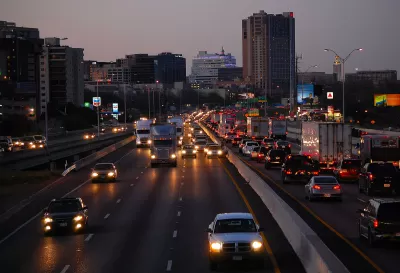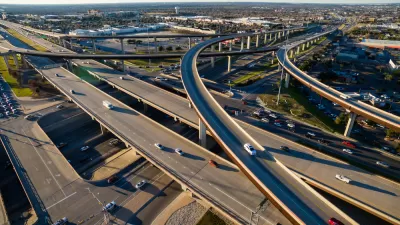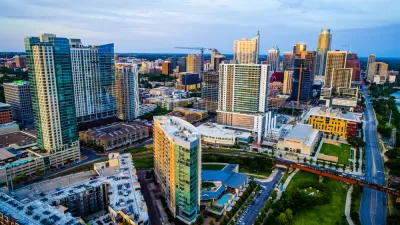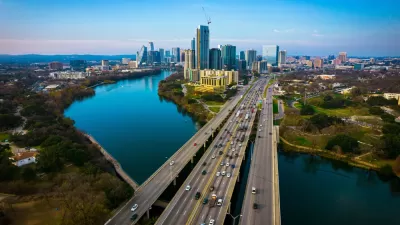TxDOT is pushing ahead with plans for a massive freeway expansion project through downtown Austin despite opposition from virtually all local leaders.

Despite Austin Mayor Steve Adler's acknowledgement that "major transportation investments in our past have done more to deepen inequality, to segregate rather than connect, to displace rather than benefit" and the city's commitment to "a $7.1 billion grid of light rail trains and bus rapid transit," Henry Grabar reports that the Texas Department of Transportation (TxDOT) is pushing ahead with plans to "expand eight miles of I-35 through downtown to a whopping 20 lanes wide," a plan opposed by almost all city leaders.
"Like in Houston, which has won temporary reprieve from a similar project, Austin’s local politicians are almost uniformly displeased with the plans from the Texas Department of Transportation, or TxDOT." But, lacking an interstate ring road, Austin faces an additional challenge. I-35 "runs from Laredo, Texas, to Duluth, Minnesota" and "TxDOT is focused on keeping that traffic moving, as well as serving fast-growing exurbs north and south of the city." The department argues that without the expansion, "[b]y 2035, the 19-mile commute from downtown Austin to Round Rock will take two-and-a-half hours."
Anti-highway advocates disagree, pointing to the well-documented phenomenon of induced demand, saying that "new patterns of development and transportation would take shape long before traffic reached that level of congestion." Transportation planners often "rely on population forecasts that assume the highway has been widened," often missing the mark on their projections for highway expansion projects. On one segment of State Highway 130, which TxDOT expanded in 2003, "traffic counts on the I-35 alternate were so low that the toll road operator filed for bankruptcy in 2016."
In a letter signed by Austin's mayor and almost every city council member, the city requested several changes, including a more narrow right-of-way, more crossings and highway decks, and a delay of the project until planned transit lines are completed.
FULL STORY: The 20-Lane Highway Texas Wants to Force Through Austin

Maui's Vacation Rental Debate Turns Ugly
Verbal attacks, misinformation campaigns and fistfights plague a high-stakes debate to convert thousands of vacation rentals into long-term housing.

Planetizen Federal Action Tracker
A weekly monitor of how Trump’s orders and actions are impacting planners and planning in America.

In Urban Planning, AI Prompting Could be the New Design Thinking
Creativity has long been key to great urban design. What if we see AI as our new creative partner?

Pedestrian Deaths Drop, Remain Twice as High as in 2009
Fatalities declined by 4 percent in 2024, but the U.S. is still nowhere close to ‘Vision Zero.’

King County Supportive Housing Program Offers Hope for Unhoused Residents
The county is taking a ‘Housing First’ approach that prioritizes getting people into housing, then offering wraparound supportive services.

Researchers Use AI to Get Clearer Picture of US Housing
Analysts are using artificial intelligence to supercharge their research by allowing them to comb through data faster. Though these AI tools can be error prone, they save time and housing researchers are optimistic about the future.
Urban Design for Planners 1: Software Tools
This six-course series explores essential urban design concepts using open source software and equips planners with the tools they need to participate fully in the urban design process.
Planning for Universal Design
Learn the tools for implementing Universal Design in planning regulations.
planning NEXT
Appalachian Highlands Housing Partners
Mpact (founded as Rail~Volution)
City of Camden Redevelopment Agency
City of Astoria
City of Portland
City of Laramie





























